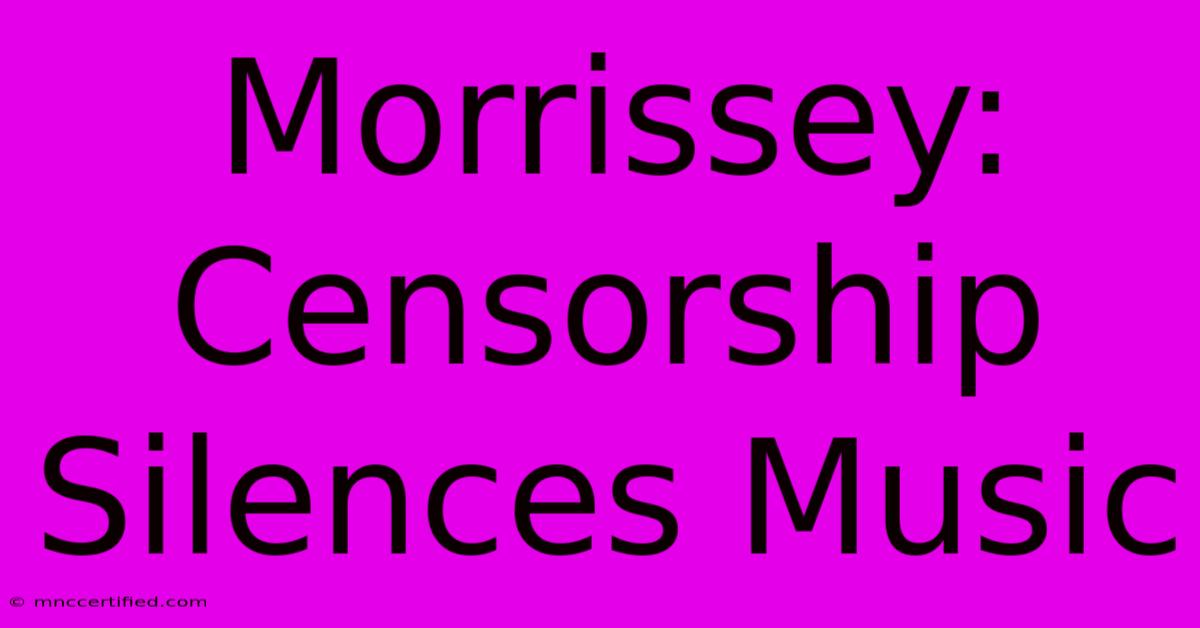Morrissey: Censorship Silences Music

Table of Contents
Morrissey: Censorship Silences Music
The career of Morrissey, the enigmatic former frontman of The Smiths, has been punctuated by controversy. While his devoted fanbase cherishes his poetic lyrics and melancholic melodies, his outspoken views and provocative statements have repeatedly led to accusations of racism, homophobia, and other forms of bigotry. This has resulted in significant censorship, raising crucial questions about freedom of speech, artistic expression, and the impact of cancel culture on musical artists. This article delves into the instances of censorship Morrissey has faced, exploring the complex interplay between artistic license and societal expectations.
The Nature of Morrissey's Controversies
Morrissey's controversies aren't simply about isolated incidents; they represent a pattern of behaviour and statements that consistently push boundaries. His critics point to interviews and lyrics interpreted as insensitive towards various minority groups. While he often defends his words as misinterpretations or satire, the impact on his audience remains undeniable. This has manifested in:
- Cancelled concerts and appearances: Several appearances have been cancelled or met with protests due to public outcry over his statements. This demonstrates the powerful influence of public opinion in shaping an artist's career.
- Removed songs and albums: While not as common as cancellations, some of Morrissey's work has been removed from streaming services or radio play following controversies, illustrating the practical effects of censorship on accessibility.
- Label distancing: Record labels have sometimes distanced themselves from Morrissey's public statements, potentially affecting promotion and distribution of his music. This highlights the commercial pressures that influence how artists navigate controversies.
The Impact of Social Media
The rise of social media has significantly amplified the impact of Morrissey's controversies. His statements are instantly disseminated to a vast audience, creating a swift and powerful reaction. This rapid spread of information often overshadows any attempts at clarification or context, leading to a sense of immediate condemnation. The speed and intensity of this online backlash can be overwhelming for both the artist and the record labels involved. This effect is a double-edged sword: it allows for immediate public response and accountability, but also creates a climate of instant judgement that can stifle open dialogue and nuanced understanding.
The Argument for Artistic Freedom
Despite the criticisms, many argue that Morrissey's provocative statements should be viewed within the context of artistic freedom. They contend that silencing dissenting voices, however controversial, ultimately restricts the freedom of expression essential to a vibrant and diverse cultural landscape. This perspective emphasizes the importance of critical engagement rather than outright censorship. Is it possible to separate the art from the artist? This complex question underlies many of the debates surrounding Morrissey's work. Many believe that his music should be judged on its artistic merits, regardless of his personal views.
Balancing Freedom of Expression with Social Responsibility
The challenge lies in finding a balance between safeguarding freedom of expression and acknowledging the social responsibility that comes with wielding influence. While artists should not be silenced for expressing controversial opinions, there's a crucial distinction between expressing unpopular ideas and promoting hate speech or inciting violence. This delicate balance is difficult to navigate, and often requires a nuanced understanding of context and intent.
The Future of Morrissey and Censorship
Morrissey's situation serves as a case study for the evolving relationship between artists, their audiences, and the forces of censorship in the digital age. The impact of social media and the speed at which controversies spread demand a careful and considered approach from both artists and their critics. The ongoing debate surrounding his work highlights the need for thoughtful discussions about freedom of expression, social responsibility, and the enduring power of music in shaping public discourse.
Keywords: Morrissey, censorship, music, controversy, freedom of speech, artistic expression, cancel culture, social media, social responsibility, artistic freedom, hate speech, public opinion.

Thank you for visiting our website wich cover about Morrissey: Censorship Silences Music. We hope the information provided has been useful to you. Feel free to contact us if you have any questions or need further assistance. See you next time and dont miss to bookmark.
Featured Posts
-
Tow Truck Insurance Requirements
Nov 21, 2024
-
Lainey Wilson Helps Little Girls Wish
Nov 21, 2024
-
Contractors Insurance Round Rock
Nov 21, 2024
-
Exploring Megan Moroneys Music Career
Nov 21, 2024
-
Hill Family Insurance Jaffrey Nh
Nov 21, 2024